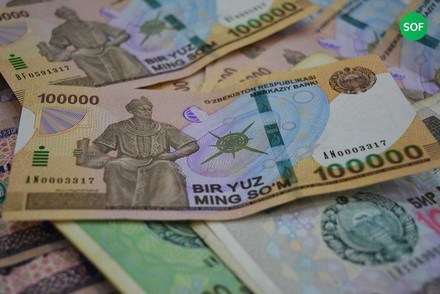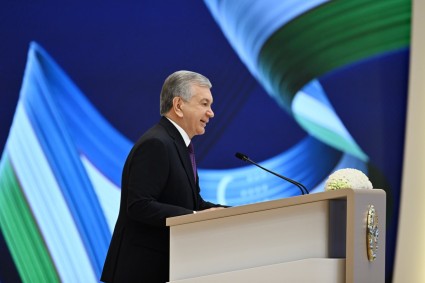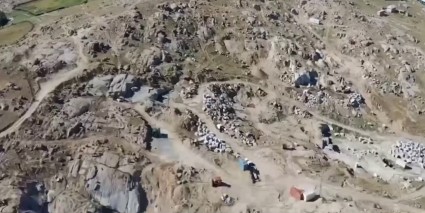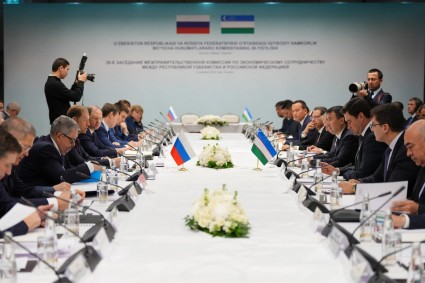The Ministry of Economy and Finance posted for public input a draft Uzbekistan’s 2025 Budget and targets for 2026-2027. Next year, GDP is projected to grow by 6% (lower than last year's forecast) — up to 1.63 quadrillion soums, and in 2026-2027 — 6.1% and 6.3%, respectively. The growth rate of industry is expected to be at 6.1%, services — 14.5%, agriculture — 4.1%. These figures are expected to be achieved through "high-quality continuation of structural reforms in each area."
Inflation is projected to be cut to 7% in 2025, 5-6% in 2026, and 5% in 2027. This differs from the previous plans of the Central Bank, which postponed achieving 5% inflation until the second half of 2025.
The draft outlines the main areas of the fiscal policy for the medium term.
The consolidated budget deficit is expected to be within 3% of GDP in 2025 and 3% of GDP in 2026-2027.
The rates of the main taxes will remain unchanged in the medium term. Therefore, in order to increase revenues, it is projected to expand the budget revenue base, revise and gradually cancel the provided tax and customs benefits depending on their efficiency.
It is projected to gradually harmonize the tax and budget policies with the requirements of the World Trade Organization.
While, all measures will be taken to ensure that the public debt does not exceed the macroeconomic safe level of 60% of GDP, and in the medium term - 50% of GDP.
The national debt is expected to increase to $45 billion (36.4% of GDP), and by 2028 — to $55.9 billion (36.7% of GDP).
The document proposes to gradually adopt the "Result-Based Budget" system when forming the annual budget, to ensure an increase in salaries and pensions by an amount not lower than the inflation rate, budget openness and to increase citizen participation in budget formation, to improve and strengthen internal control and internal audit in the public sector.
Meanwhile, it is projected to reflect the national sustainable development goals when preparing and reviewing the draft state budget, to gradually adopt the Green Budgeting principles, to ensure the priority of environmental and nature protection, measures to adapt to climate change, and to completely revise the structure of budget expenditures together with international experts.
Based on these goals and areas, excluding interbudget transfers, consolidated budget revenues for 2025 are expected to be at the level of 431.1 trillion soums, expenses 480.3 trillion soums. Budget revenues will amount to 308.5 trillion soums, and expenses - 290.2 trillion soums.
Budget revenues are projected at 66.5 trillion soums, expenses - 117.2 trillion soums. At the same time, it is projected to direct 54.4 trillion soums of transfers from the republican budget to these funds.
Off-budget revenues of the Pension Fund are expected at the level of 58.9 trillion soums, expenses - 74.9 trillion soums.
Expenditures projected for state programs at the expense of external debts will amount to 18.4 trillion soums.
The maximum deficit of the consolidated budget (including the state budget, budgets of state target funds, extra-budgetary funds of budgetary organizations and funds of the Reconstruction and Development Fund) should be within 49.26 trillion soums, or 3% of GDP.
The state budget and budgets of state target funds are projected with a deficit of 32.38 trillion soums, or almost 2% of GDP.
The deficit is projected to be covered by attracting state domestic and foreign debt, funds from the privatization of state assets and other sources.
Next year, Uzbekistan could attract more loans at the expense of debt. If the limits on attracting external borrowing this year are $5 billion under a state guarantee, then next year - $5.5 billion. Of this amount, $3 billion will be directed to support the state budget, $2.5 billion - to finance investment projects.
To diversify the government debt portfolio and reduce currency risks, it is projected to set the maximum net volume of government securities issued on behalf of Uzbekistan at 30 trillion soums for 2025 (25 trillion soums for 2024).
In addition, to reduce risks for the state budget, it is established that the upper limit of the cost of new public-private partnership projects involving the state's assumption of obligations (purchase or payment) will be $6.5 billion.
At the government meeting on October 18, President Shavkat Mirziyoyev underscored the importance of optimizing expenses and increasing revenues through digitalization and AI. In the new year, 78 districts will be transferred to self-financing. Instructions were given to increase exports to 25% and approve the localization program in parliament.
By 2030, it is planned to bring the Uzbek GDP at $200 billion, which exceeds the earlier forecast of $160 billion, the first deputy head of the Ministry of Economy and Finance said. The goal of cutting the inflation to 5% is expected to be achieved by 2027, which is later than the Central Bank's plans. 2025 has been declared the year of savings and stability.
More details on the draft state budget and budget message can be found at the links.












